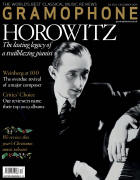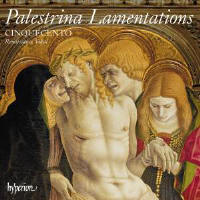Texte paru dans: / Appeared in: Code-barres / Barcode : /034571282848 |
|
|
Outil de traduction (Très approximatif) |
|
|
Reviewer:
Edward Breen Palestrina’s second book of Lamentations is surprisingly passionate, and this performance in particular is a gentle reminder that the spacious, clear polyphony of the Ars Perfecta did not preclude a great deal of passionate nuance. Cinquecento – like a European chapel choir of the Renaissance – brings together a fine selection of singers from across the continent, forming a true European union. Their performance of these Lamentations adheres closely to the text, balancing each madrigalian nuance within the overall phrase architecture. Their sound is reminiscent of The Hilliard Ensemble, particularly in the delightful interplay of their two well-matched tenors and the warmth of the overall blend captured through a close, warm recording technique. Perhaps the most striking musical feature is the generous music that Palestrina lays out for the Hebrew letters beginning each Lamentation text, which often showcases the lower sonorities of these singers. Take, for instance, Lectio III for Maunday Thursday: first there is a slipstream of luxuriant polyphony for the letter caph, where the voices are rich, resonant and perfectly balanced, and later there is another superb meld of lower voices and sonorous purity in ‘O vos omnes’. At moments like this you have to admire how much yearning and mourning, dissonance and suspension Palestrina got under the net – these Lamentations, and particularly this performance, really do reframe Ars Perfecta in a wider context. On this note I particularly admire ‘Magna est enim velut mare contritio tua’ (For your downfall is as great at the sea) from the Lamentations for Good Friday, where the sea almost literally sweeps in for this verse. But perhaps the most arresting and unexpected touch is the eight-voice setting of ‘Jerusalem, Jerusalem’ at the end of Lectio III for Holy Saturday, where three extra tenor parts fill out the texture and create a magical ending. Throughout this album Cinquecento offer a performance which is truly reflective and tender. |
|




